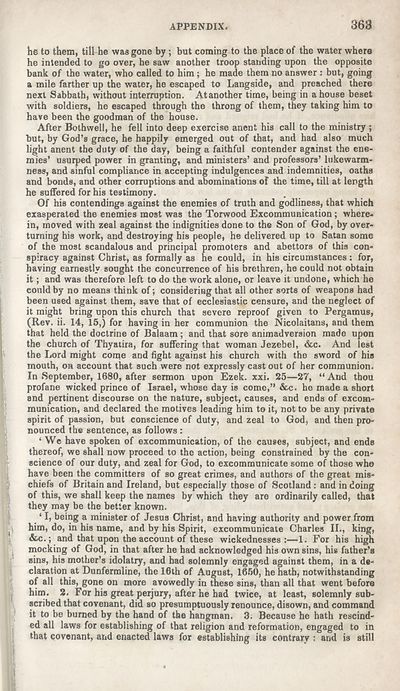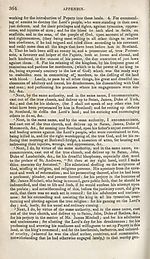Religion & morality > Cloud of witnesses, for the royal prerogatives of Jesus Christ, or, The last speeches and testimonies of those who suffered for the truth in Scotland, in the years 1681-1688, with an appendix, containing the Queensferry paper, Torwood excommunications, &c
(419)
Download files
Complete book:
Individual page:
Thumbnail gallery: Grid view | List view

APPENDIX.
363
he to them, till he was gone by ; but coming to the place of the water where
he intended to go over, he saw another troop standing upon the opposite
bank of the water, who called to him; he made them no answer : but, going
a mile farther up the water, he escaped to Langside, and preached there
next Sabbath, without interruption. At another time, being in a house beset
with soldiers, he escaped through the throng of them, they taking him to
have been the goodman of the house.
After Bolhwell, he fell into deep exercise anent his call to the ministry ;
but, by God’s grace, he happily emerged out of that, and had also much
light anent the duty of the" day, being a faithful contender against the ene¬
mies’ usurped power in granting, and ministers’ and professors’ lukewarm¬
ness, and sinful compliance in accepting indulgences and indemnities, oaths
and bonds, and other corruptions and abominations of the time, till at length
he suffered for his testimony.
Of his contendings against the enemies of truth and godliness, that which
exasperated the enemies most was the Torwood Excommunication; where¬
in, moved with zeal against the indignities done to the Son of God, by over¬
turning his work, and destroying his people, he delivered up to Satan some
of the most scandalous and principal promoters and abettors of this con¬
spiracy against Christ, as formally as he could, in his circumstances : for,
having earnestly sought the concurrence of his brethren, he could not obtain
it; and was therefore left to do the work alone, or leave it undone, which he
could by no means think of; considering that all other sorts of weapons had
been used against them, save that of ecclesiastic censure, and the neglect of
it might bring upon this church that severe reproof given to Pergamus,
(Rev. ii. 14, 15,) for having in her communion the Nicolaitans, and them
that held the doctrine of Balaam; and that sore animadversion made upon
the church of Thyatira, for suffering that woman Jezebel, &c. And lest
the Lord might come and fight against his church with the sword of his
mouth, on account that such were not expressly cast out of her communion.
In September, 1680, after sermon upon Ezeic. xxi. 25—27, “ And thou
profane wicked prince of Israel, whose day is come,” &c. he made a short
and pertinent discourse on the nature, subject, causes, and ends of excom¬
munication, and declared the motives leading him to it, not to be any private
spirit of passion, but conscience of duty, and zeal to God, and then pro¬
nounced the sentence, as follows :
‘ We have spoken of excommunication, of the causes, subject, and ends
thereof, we shall now proceed to the action, being constrained by the con¬
science of our duty, and zeal for God, to excommunicate some of those who
have been the committers of so great crimes, and authors of the great mis¬
chiefs of Britain and Ireland, but especially those of Scotland : and in doing
of this, we shall keep the names by which they are ordinarily called, that
they may be the better known.
‘ I, being a minister of Jesus Christ, and having authority and power from
him, do, in his name, and by his Spirit, excommunicate Charles II., king,
&c.; and that upon the account of these wickednesses:—1. For his high
mocking of God, in that after he had acknowledged his own sins, his father’s
sins, his mother’s idolatry, and had solemnly engaged against them, in a de¬
claration at Dunfermline, the 16th of August, 1650, he hath, notwithstanding
of all this, gone on more avowedly in these sins, than all that went before
him. 2. For his great perjury, after he had twice, at least, solemnly sub¬
scribed that covenant, did so presumptuously renounce, disown, and command
it to be burned by the hand of the hangman. 3. Because he hath rescind¬
ed all laws for establishing of that religion and reformation, engaged to in
that covenant, and enacted laws for establishing its contrary : and is still
363
he to them, till he was gone by ; but coming to the place of the water where
he intended to go over, he saw another troop standing upon the opposite
bank of the water, who called to him; he made them no answer : but, going
a mile farther up the water, he escaped to Langside, and preached there
next Sabbath, without interruption. At another time, being in a house beset
with soldiers, he escaped through the throng of them, they taking him to
have been the goodman of the house.
After Bolhwell, he fell into deep exercise anent his call to the ministry ;
but, by God’s grace, he happily emerged out of that, and had also much
light anent the duty of the" day, being a faithful contender against the ene¬
mies’ usurped power in granting, and ministers’ and professors’ lukewarm¬
ness, and sinful compliance in accepting indulgences and indemnities, oaths
and bonds, and other corruptions and abominations of the time, till at length
he suffered for his testimony.
Of his contendings against the enemies of truth and godliness, that which
exasperated the enemies most was the Torwood Excommunication; where¬
in, moved with zeal against the indignities done to the Son of God, by over¬
turning his work, and destroying his people, he delivered up to Satan some
of the most scandalous and principal promoters and abettors of this con¬
spiracy against Christ, as formally as he could, in his circumstances : for,
having earnestly sought the concurrence of his brethren, he could not obtain
it; and was therefore left to do the work alone, or leave it undone, which he
could by no means think of; considering that all other sorts of weapons had
been used against them, save that of ecclesiastic censure, and the neglect of
it might bring upon this church that severe reproof given to Pergamus,
(Rev. ii. 14, 15,) for having in her communion the Nicolaitans, and them
that held the doctrine of Balaam; and that sore animadversion made upon
the church of Thyatira, for suffering that woman Jezebel, &c. And lest
the Lord might come and fight against his church with the sword of his
mouth, on account that such were not expressly cast out of her communion.
In September, 1680, after sermon upon Ezeic. xxi. 25—27, “ And thou
profane wicked prince of Israel, whose day is come,” &c. he made a short
and pertinent discourse on the nature, subject, causes, and ends of excom¬
munication, and declared the motives leading him to it, not to be any private
spirit of passion, but conscience of duty, and zeal to God, and then pro¬
nounced the sentence, as follows :
‘ We have spoken of excommunication, of the causes, subject, and ends
thereof, we shall now proceed to the action, being constrained by the con¬
science of our duty, and zeal for God, to excommunicate some of those who
have been the committers of so great crimes, and authors of the great mis¬
chiefs of Britain and Ireland, but especially those of Scotland : and in doing
of this, we shall keep the names by which they are ordinarily called, that
they may be the better known.
‘ I, being a minister of Jesus Christ, and having authority and power from
him, do, in his name, and by his Spirit, excommunicate Charles II., king,
&c.; and that upon the account of these wickednesses:—1. For his high
mocking of God, in that after he had acknowledged his own sins, his father’s
sins, his mother’s idolatry, and had solemnly engaged against them, in a de¬
claration at Dunfermline, the 16th of August, 1650, he hath, notwithstanding
of all this, gone on more avowedly in these sins, than all that went before
him. 2. For his great perjury, after he had twice, at least, solemnly sub¬
scribed that covenant, did so presumptuously renounce, disown, and command
it to be burned by the hand of the hangman. 3. Because he hath rescind¬
ed all laws for establishing of that religion and reformation, engaged to in
that covenant, and enacted laws for establishing its contrary : and is still
Set display mode to:
![]() Universal Viewer |
Universal Viewer | ![]() Mirador |
Large image | Transcription
Mirador |
Large image | Transcription
| Permanent URL | https://digital.nls.uk/132220667 |
|---|
| Description | Thousands of printed books from the Antiquarian Books of Scotland collection which dates from 1641 to the 1980s. The collection consists of 14,800 books which were published in Scotland or have a Scottish connection, e.g. through the author, printer or owner. Subjects covered include sport, education, diseases, adventure, occupations, Jacobites, politics and religion. Among the 29 languages represented are English, Gaelic, Italian, French, Russian and Swedish. |
|---|

